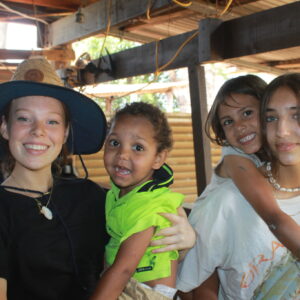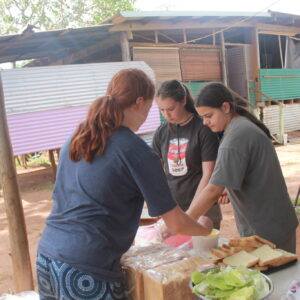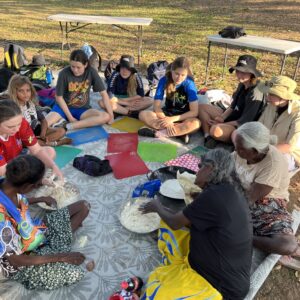
SCEGGS Stories of Immersion in Indigenous Australia
We hope you enjoy reading a range of reflections about Stories of Immersion in Indigenous Australia from the students this week. For the previous week’s reflections see here.
Reflections from the Cape York Immersion
Sleeping under the stars,
The maps of many,
And the calendar of the old people,
It holds many memories
Least of all us,
Staring in wonder and awe,
Hearts just a little sore,
Knowing this view is once in a life
We savoured the sky,
And swallowed the moon’s light
We heard the call of a bird,
Felt the rumbles beneath the ground,
Dozed off to the sounds.
The earth living despite us
With wonder and might
The stubborn ground and eternal sky,
With birds that fly, and ‘roos that run
This is Australia.
We observed the Red Earth,
The dust beneath our feet
Slipping between our toes
And were told how the colour belonged to the dreamtime.
The whispers on the wind pleading with us
To share the stories it has seen while passing through the land
Stories of faces long lost,
And hands long scarred
Blood long shed
Peace long marred
As we were slipping and sliding in the rocks of old
And the company of new companions.
Although our reverie is heard
We are only visitors here,
We return to our lives changed,
And will never forget the moments and tears,
Happiness, hopes or fears,
That have allowed us to roam here.
Zoe Linder
Year 10
Cape York, what a beautiful and informative journey. I’ve grown such an extensive and important knowledge on Indigenous culture and the world. For me personally, it had been a growth moment because it really taught me so much, about how to care for my country and to take the chance to talk to my elders to gain the knowledge of my culture and where I live.
At Yungee Bush Camp, we learned the importance of looking after land, the strength in connection to family and their understanding of how to use the traditional land around them. Desmond, one of the traditional owners, took us through his life explaining how he cut down his land all by hand with the help of his friends and an axe for a station. He also explained to us that because of the Native Title Act he got his land back, but because there are two National Parks surrounding his home, he said that “I got the worst part” and it really highlights that although it is relieving to gain that recognition, it didn’t feel complete. Throughout the days spent there, he showed immaculate willingness to teach and perseverance, as he kept going to and from hospital for dialysis, he was still willing to come outside and teach us about his culture and tell us stories, illustrating how important this knowledge is to pass onto others. Estelle, another traditional owner and Desmond’s wife, showed us how to make damper and was really open to teaching us about her family and traditions no matter the question that was asked. On our final day she said to us, “If you were to take my blood and yours, it would bleed the same because we are family.” Really communicating to us that no matter who you are, Indigenous or non-Indigenous, it is important to connect to one another and learn from each other’s experiences. The kids at Yungee really showcased the beautiful nature of childhood without technology, they had endless things to do, having the most fun with the little things they could find. One day they filled gloves with water and painted on them, playing with them for the entire day not breaking a sweat or getting bored because they had the endless landscape around them to run around and play. The kids also show how important it is to pass down culture because they performed traditional dances for us while Desmond played the clapsticks. They knew all the dances and all the children who were there participated. Not being shy, they even taught us the shakealeg (a traditional Indigenous dance) although I’m not the best at it. Yungee was a very free and mentally changing experience for me because it really opened my eyes to living in the moment, taking the time to look around you and appreciating the little things in life. It was an emotional departure from the homeland but looking back I don’t ever regret allowing myself to take this trip.
Loggy Crossing, wow, what an upbeat and stunning place. The traditional owners Dora and Trevor on our first night, sang us beautiful songs written and composed by themselves (they are a band called The Red Soil), accompanied by their nephew Naz who sang beautifully. They sang an abundance of their own songs which were lovely to hear and made a lot of us cry. Their daughter Tammy, has a cheerful and upbeat personality and she really wanted us to tell the wider community that the stereotypes Indigenous people face are not true. She said, “When you see an Indigenous person in the street drunk you think, ‘wow, what a disgusting person, better leave them, they’re just like that’, but when you see a white man on the street drunk you think, ‘Oh my gosh, that’s so-and-so, we better go help them.’” We went on a bush walk looking at the gorgeous scenery with Trevor as our guide so we could find the plants that they used for certain things. This taught me that they use the nature around them for so many things and they use it all effectively and sustainably, not taking too much for themselves. That night Trevor, Naz, and Dora gave us the opportunity to listen to their songs, as if we were in a concert, seated, watching, and listening to their pleasing voices, which again made people cry because of how lovely and emotionally charged the songs were.
Ebony Colliss
Year 10
I have decided to make a collage to reflect Miriam-Rose’s ideology of “walking in two worlds“. The immersion to the top end of Australia opened my eyes to the ignorance we face in Sydney on the needs of the Indigenous community within Australia. It taught me that the First Nations people of Australia are similar to us in a magnitude of ways, but also still have strong connections to the rich history they are a part of, and choose to reflect this within a variety of ways. Cheryl showed her connection to her culture by sharing it with us through the occupation she has at the Miriam-Rose Foundation. The community at Banatjarl shared their connection to their history with us around sharing stories in a circle at night time, playing the Digeridoo for us and sharing the belief of not cooking after dusk, so the spirits do not become disturbed. Moving forward with reconciliation I will continue to remember Miriam-Rose’s quote.
“walking in two worlds” to deepen my empathy towards any Indigenous person branching out and experiencing a western way of life, and I will try to share my understanding of the Indigenous communities we visited and try to take any opportunities that arise to be in a similar situation, where I am able to visit or live in an Indigenous community.
Please see this article about Dr Miriam-Rose, the 2021 Senior Australian of the Year, for further context about Antonia’s collage.
Antonia Miller
Year 11






















